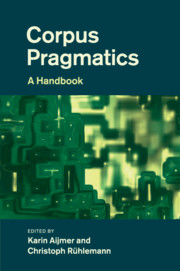43 results
List of tables
-
- Book:
- Corpus Pragmatics
- Published online:
- 18 December 2014
- Print publication:
- 18 December 2014, pp x-xii
-
- Chapter
- Export citation
Index
-
- Book:
- Corpus Pragmatics
- Published online:
- 18 December 2014
- Print publication:
- 18 December 2014, pp 454-461
-
- Chapter
- Export citation
Introduction - Corpus pragmatics: laying the foundations
-
-
- Book:
- Corpus Pragmatics
- Published online:
- 18 December 2014
- Print publication:
- 18 December 2014, pp 1-26
-
- Chapter
- Export citation
Part II - Corpora and pragmatic principles
-
- Book:
- Corpus Pragmatics
- Published online:
- 18 December 2014
- Print publication:
- 18 December 2014, pp 115-192
-
- Chapter
- Export citation
12 - Deixis
- from Part V - Corpora and reference
-
-
- Book:
- Corpus Pragmatics
- Published online:
- 18 December 2014
- Print publication:
- 18 December 2014, pp 331-359
-
- Chapter
- Export citation
List of figures
-
- Book:
- Corpus Pragmatics
- Published online:
- 18 December 2014
- Print publication:
- 18 December 2014, pp vii-ix
-
- Chapter
- Export citation
Copyright page
-
- Book:
- Corpus Pragmatics
- Published online:
- 18 December 2014
- Print publication:
- 18 December 2014, pp iv-iv
-
- Chapter
- Export citation
Part I - Corpora and speech acts
-
- Book:
- Corpus Pragmatics
- Published online:
- 18 December 2014
- Print publication:
- 18 December 2014, pp 27-114
-
- Chapter
- Export citation
Contents
-
- Book:
- Corpus Pragmatics
- Published online:
- 18 December 2014
- Print publication:
- 18 December 2014, pp v-vi
-
- Chapter
- Export citation
Corpus Pragmatics - Half title page
-
- Book:
- Corpus Pragmatics
- Published online:
- 18 December 2014
- Print publication:
- 18 December 2014, pp i-ii
-
- Chapter
- Export citation
Part V - Corpora and reference
-
- Book:
- Corpus Pragmatics
- Published online:
- 18 December 2014
- Print publication:
- 18 December 2014, pp 329-378
-
- Chapter
- Export citation

Corpus Pragmatics
- A Handbook
-
- Published online:
- 18 December 2014
- Print publication:
- 18 December 2014
Corpus Pragmatics - Title page
-
-
- Book:
- Corpus Pragmatics
- Published online:
- 18 December 2014
- Print publication:
- 18 December 2014, pp iii-iii
-
- Chapter
- Export citation
Part VI - Corpora and turn-taking
-
- Book:
- Corpus Pragmatics
- Published online:
- 18 December 2014
- Print publication:
- 18 December 2014, pp 379-453
-
- Chapter
- Export citation
Part IV - Corpora and evaluation
-
- Book:
- Corpus Pragmatics
- Published online:
- 18 December 2014
- Print publication:
- 18 December 2014, pp 277-328
-
- Chapter
- Export citation
Notes on contributors
-
-
- Book:
- Corpus Pragmatics
- Published online:
- 18 December 2014
- Print publication:
- 18 December 2014, pp xiii-xviii
-
- Chapter
- Export citation
Part III - Corpora and pragmatic markers
-
- Book:
- Corpus Pragmatics
- Published online:
- 18 December 2014
- Print publication:
- 18 December 2014, pp 193-276
-
- Chapter
- Export citation
4 - Recipient design I: How do narrators mark quotation?
-
- Book:
- Narrative in English Conversation
- Published online:
- 18 December 2013
- Print publication:
- 09 January 2014, pp 110-154
-
- Chapter
- Export citation
Narrative in English Conversation - Title page
-
-
- Book:
- Narrative in English Conversation
- Published online:
- 18 December 2013
- Print publication:
- 09 January 2014, pp iii-iii
-
- Chapter
- Export citation
Copyright page
-
- Book:
- Narrative in English Conversation
- Published online:
- 18 December 2013
- Print publication:
- 09 January 2014, pp iv-iv
-
- Chapter
- Export citation

